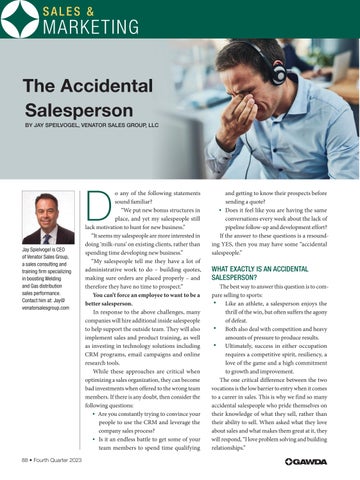SALES &
MARKETING The Accidental Salesperson BY JAY SPEILVOGEL, VENATOR SALES GROUP, LLC
D Jay Spielvogel is CEO of Venator Sales Group, a sales consulting and training firm specializing in boosting Welding and Gas distribution sales performance. Contact him at: Jay@ venatorsalesgroup.com
88 • Fourth Quarter 2023
o any of the following statements sound familiar? “We put new bonus structures in place, and yet my salespeople still lack motivation to hunt for new business.” “It seems my salespeople are more interested in doing ‘milk-runs’ on existing clients, rather than spending time developing new business.” “My salespeople tell me they have a lot of administrative work to do – building quotes, making sure orders are placed properly – and therefore they have no time to prospect.” You can’t force an employee to want to be a better salesperson. In response to the above challenges, many companies will hire additional inside salespeople to help support the outside team. They will also implement sales and product training, as well as investing in technology solutions including CRM programs, email campaigns and online research tools. While these approaches are critical when optimizing a sales organization, they can become bad investments when offered to the wrong team members. If there is any doubt, then consider the following questions: • Are you constantly trying to convince your people to use the CRM and leverage the company sales process? • Is it an endless battle to get some of your team members to spend time qualifying
and getting to know their prospects before sending a quote? • Does it feel like you are having the same conversations every week about the lack of pipeline follow-up and development effort? If the answer to these questions is a resounding YES, then you may have some “accidental salespeople.”
WHAT EXACTLY IS AN ACCIDENTAL SALESPERSON? The best way to answer this question is to compare selling to sports: • Like an athlete, a salesperson enjoys the thrill of the win, but often suffers the agony of defeat. • Both also deal with competition and heavy amounts of pressure to produce results. • Ultimately, success in either occupation requires a competitive spirit, resiliency, a love of the game and a high commitment to growth and improvement. The one critical difference between the two vocations is the low barrier to entry when it comes to a career in sales. This is why we find so many accidental salespeople who pride themselves on their knowledge of what they sell, rather than their ability to sell. When asked what they love about sales and what makes them great at it, they will respond, “I love problem solving and building relationships.”
